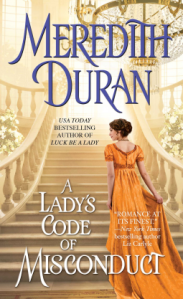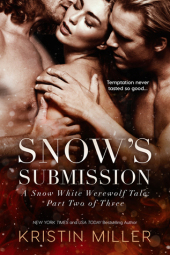 Miss Bates was conflicted reading Duran’s latest, A Lady’s Code Of Misconduct, her responses a roller-coaster of dips and climbs of disappointment or enthusiasm. Misconduct contains Duran’s signature themes: trust, conscience, identity, wealth, class, ambition, power, and how they mesh, shift, and change as two people who start out one way make their way to their better selves because they discover they love the other.
Miss Bates was conflicted reading Duran’s latest, A Lady’s Code Of Misconduct, her responses a roller-coaster of dips and climbs of disappointment or enthusiasm. Misconduct contains Duran’s signature themes: trust, conscience, identity, wealth, class, ambition, power, and how they mesh, shift, and change as two people who start out one way make their way to their better selves because they discover they love the other.
To start, Duran’s narrative takes a convoluted route, opening with a compelling scene and then flashback to bring us the sequence of events leading to it. A man in his prime, a Victorian MP, Crispin Burke, lies dying of a head wound in his parents’ London house. Charlotte, his sister, brings a young woman to his death-bed, a woman who is familiar, yet he’s ignorant of their relationship. Jane Burke, née Mason, announces she is his wife.
Duran then takes us three months prior: filling in Crispin and Jane’s unholy alliance, bred of coercion, manipulation, and expediency. Duran’s plot starts and remains tangled. Crispin and Jane have been long-acquainted: Crispin, a frequent visitor to Jane’s uncle’s, her guardian’s, estate. Allied by ambition, Crispin and Uncle Philip shared a politics of personal gain. They’re not friends, nor loyal, content to use each other for political gain. Duran sets up the villainy: by pointing to how people, without love, see the other as an object, used for personal advancement.
In flashback, we learn Jane and Crispin’s marriage-of-convenience came at the end of an antagonistic yet mutually beneficial arrangement. Jane and Crispin are initially trapped by money and, in turn, want to use money to free themselves. Jane is an heiress, but Uncle Philip is using her money to advance politically and financially. He’s sequestered her in the country; at 23, she’s never been to London, or had a début as would be her heiress-wont. Philip plans to marry Jane to his gormless son, Archibald, to ensure her fortune remains “in the family.” Jane, despite her meek, lacklustre appearance, plans an escape, marry for convenience and gain control of her fortune. Crispin catches and returns her to Uncle Philip – with a proviso to save her reputation and keep her plans secret as long as she spies on Philip on his behalf. In return, he will help her avoid Archibald by providing her with a false marriage, thanks to an archbishop Crispin has in his pocket. (What Spy-Jane discovers, which we don’t learn about till long after Crispin miraculously survives the head-blow that felled him when he was set upon by ruffians, is the novel’s romantic suspense plot’s crux.)
Miss Bates enjoyed how Duran showed Crispin and Jane entrapped by money: Jane because she had it and Crispin because, as a second son, he didn’t. As Crispin lies dying, Jane, though we’re never witness to this scene, uses Crispin’s arrangement with the archbishop to create a mock-marriage with him, ensuring her escape from Uncle Philip. Except Crispin doesn’t die and the archbishop does. When Crispin wakes, it is to the sight of his wife, Jane. And wife she is as far as he’s concerned because Crispin has amnesia. With the archbishop dead, her fortune still tied up with her uncle, no means to undo the “marriage” (as it is on public record), Jane finds herself married to the man who, until now, was her drama’s villain.
Duran’s premise swallows her novel’s first half. Miss Bates wasn’t impressed. But Duran is a novelist capable of complex, interesting characterisation. Her characters’ inner worlds, motivations and conflicts, inner and with each other, win her over. Duran uses Crispin’s amnesia and physical weakness, much as Kinsale does Jervaulx’s stroke, to call forth the emergence of a better man and cement the romance’s main theme – love brings about a transformation that is in potentia given the right conditions: a change of heart brought about by caring for the beloved. Crispin’s journey is in becoming a good man, which, given that he doesn’t remember the villain-self who bribed and coerced his way into political power, is, at least initially, as easy as simply deciding to be his best self.
Duran has a character quandary and MissB. isn’t sure she answered it well. From whence does this new, improved Crispin come? It can’t be, at least initially, from his love for Jane: he can’t love what he can’t remember; at most, what he feels is a gentleman’s duty and good will. “Good” Crispin fails at first because he seems to appear like Athena sprung from her father, Zeus’s head – out of the blue, Crispin, a gracious, warm being. He seems to come from a decent family and behaves as they would have a gentleman, with manners, education, and grace. So, what created Past-Bad-Crispin? Sadly, there’s melodrama and hurt, blame, and a “sad sad thing” that happened. Bit of a cop-out, thought MissB., when compared to Jervaulx’s frustrated little cruelties, Good-Crispin is less interesting than Flashback-Crispin.
What of Jane? Considered superficially, Jane is less compelling. Her flaws are borne of being a woman at a time when women were “less than”. Her sins are deception and not speaking her mind, not showing what a fine mind she has. Being married to the loving, understanding Crispin-Two gives her that freedom. Jane blossoms under him and comes forth as a highly intelligent, moral woman. With Jane’s blooming, the care for the poor and oppressed her parents taught her, comes to light. Jane guides Improved-Crispin to ethical political choices and the championing of causes to help the vulnerable. Jane manifests as a political thinker as astute as Crispin: now they’re on the right side and united, the good they can do is boundless. This part of the novel was well done. (Miss Bates enjoyed it as much as she did the relationship portrayed in the film, Amazing Grace, between William Wilberforce and Barbara Spooner.)
Jane’s mistrust of her husband (will he go back to Bad-Crispin once he remembers all?) becomes a point of contention/confusion for Crispin. When Crispin remembers the man he was, he understands Jane’s misgivings. He feels shame, but also wants her to love the whole of him, flaws, past, and all. Crispin wants Jane to choose him, even knowing who he was, not only because he now uses his formidable abilities for good. In turn, Jane is ashamed of her deception and feels she’s living on borrowed time with the New-Crispin she loves. It’s a mess, but Duran has something to say about what Crispin and Jane need to do to “unmess” and make their way to love and commitment. An integration of personality, with flaws, foibles, weaknesses, vulnerabilities, and even villainies, must be achieved within both hero and heroine in the service of love, commitment, fidelity, and the greater good, the community, for true happiness to be possible.
Duran’s novel is convoluted and contrived, but also thought-provoking. It is the romance of a couple’s great journey learning to bare their softest, truest selves to be free to live their love. In the end, Misses Austen and Bates were won over by Duran’s A Lady’s Code Of Misconduct: “a mind lively and at ease,” Emma.
Meredith Duran’s A Lady’s Code Of Misconduct is published by Pocket Books. It was released in February 2017 and is available at your preferred vendors. Miss Bates received an e-ARC from Pocket Books, via Netgalley.
Rate this:Share this:- More





